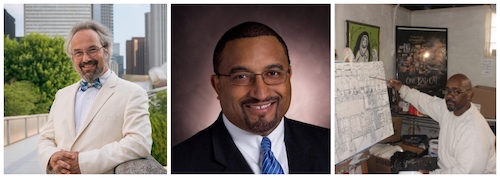by Jarrett Hoffman
TODAY IN THE NEWS:
Two announcements arrived this morning. In a livestream, the Cleveland Institute of Music named Carlos Kalmar (left) as Director of Orchestral and Conducting Programs and Principal Conductor. The Uruguayan-born maestro recently stepped down from his 18-year tenure as music director of the Oregon Symphony. He has also served as artistic director and principal conductor of the Grant Park Music Festival since 2000. Read more from CIM here.
Another piece of news that arrived was the creation of a new nonprofit arts alliance in Greater Cleveland, Assembly for the Arts. Set to launch in mid-June under the leadership of Jeremy V. Johnson (middle) — a Cleveland native who recently served as Executive Director of New Arts in New Jersey — the organization’s aim is to provide a unified voice, set regional goals, and represent shared priorities for the creative economy in Northeast Ohio. Read the press release here for details.
On a more somber note, last week brought news of the passing of Cleveland-based visual artist Michelangelo Lovelace (right), who died on April 26 at age 60 at his home in Cudell after battling pancreatic cancer.
It’s worth checking out his Q&A and video interview from MOCA Cleveland to get a sense of his personality, as well as obituaries from Cleveland.com and The New York Times to read about his life, struggles, and accomplishments — including a 2015 Mid-Career Prize from the Cleveland Arts Prize, and a 2018 showing of his work at the Fort Gansevoort gallery in Manhattan. Plus, both of those articles show a selection of his works, from his visually and emotionally complex depictions of low-income Black neighborhoods in Cleveland, to his intimate drawings of elderly patients he cared for as a nursing aide.
TODAY ON THE WEB:
CIM will share student performances of the Percussion Ensemble and three woodwind ensembles tonight at 7, 8, and 9:00. And at 7:30, the Chamber Music Society of Lincoln Center will present a “Composers in Focus” concert that centers around Joan Tower, featuring performances by violist Paul Neubauer, bassoonist Peter Kolkay, and the Calidore Quartet. Details in our Concert Listings.
TODAY’S ALMANAC:
English tenor Richard Lewis was born on this date in 1914 in Manchester, followed exactly two years later by the birth of American composer Milton Babbitt in Philadelphia.
Though Lewis was particularly noted for his interpretations of the music of Handel — see Daniel Hathaway’s Diary entry last year — he also helped contemporary opera enter into the world through several premieres, including William Walton’s Troilus and Cressida, in which he sang the role of Troilus. Listen to a recording of Scenes from Troilus and Cressida here, where Lewis (who enters at the 4:30 mark) is joined by another very famous voice: that of soprano Elisabeth Schwarzkopf.
Babbitt may have been a contemporary of Walton, but their styles of composition are quite contrasting — though perhaps both composers are painted with too broad a brush. By the middle of Walton’s career, his music was considered conservative and Romantic (though he would come into fashion again late in his life), while Babbitt is best known for writing with intense, complex logic and structure.
On the other hand, as Allan Kozinn wrote in The New York Times following Babbitt’s passing in 2011, listeners “who simply sat back and listened, rather than trying to understand his harmonies and structural processes…often discovered works of great expressive variety.”
One subtle but powerful work of Babbitt’s is the 1976 Solo Requiem for soprano and two pianists. As the critic John Rockwell wrote in a review of its premiere, its texts “express the incomprehensibility and protestations of the living faced with the bereavement of death,” and its music “is appropriately fragmented and chill.” Listen to a recording by the musicians who gave that premiere — soprano Bethany Beardslee and pianists Cheryl Seltzer and Joel Sachs — divided into parts one, two, and three.




